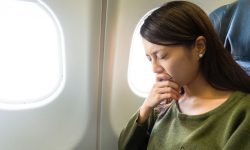Aviophobia Fear of Flying
Fear of flying, also known as aviophobia, is a common type of specific phobia that involves an intense and irrational fear of traveling by air. People with this fear often experience significant anxiety or panic when they have to fly or even think about flying. The fear can range from mild discomfort to severe phobia, preventing individuals from traveling by plane altogether.
Do you have a fear of flying? Is it affecting your life and relationships? Whether you need to travel for business or family, a fear of flying can make that impossible. Please read our self-help tips to help you overcome this fear.
Some common reasons why people develop a fear of flying include:
- Fear of crashing: Fear of plane crashes is a common concern, despite the statistically low likelihood of such events.
- Lack of control: Some individuals feel anxious about being in a situation where they have little control over the flight.
- Fear of heights: For some, it's not the act of flying itself but the fear of heights or the feeling of being enclosed in a small space that triggers anxiety.
- Previous negative experiences: A bad experience during a flight, such as turbulence, may contribute to the fear of flying.
- Media influence: News reports or sensationalized portrayals of plane accidents in the media can heighten anxiety.
- General anxiety: Fear of flying can be a manifestation of broader anxiety issues.
Addressing the fear of flying may require different strategies depending on its severity. Here are some techniques that might help:
- Education: Learning about aviation safety, statistics, and the mechanics of flying can help dispel misconceptions and irrational fears.
- Relaxation techniques: Practicing relaxation exercises like deep breathing or meditation can help manage anxiety during flights.
- Cognitive-behavioral therapy (CBT): CBT is an evidence-based approach that helps individuals challenge negative thought patterns and replace them with more constructive ones.
- Desensitization: Gradual exposure to flying-related stimuli can help individuals become desensitized to their fear over time.
- Support groups: Joining support groups for people with a fear of flying can provide a sense of community and understanding.
- Professional help: In severe cases, seeking help from a therapist or counselor specializing in anxiety disorders or phobias can be beneficial.
- Medication: In some cases, short-term medication may be prescribed to manage anxiety during flights, but this should be discussed with a healthcare professional.
It's important to remember that fear of flying is a common issue, and many people overcome it successfully with the right support and strategies. If you or someone you know is struggling with this fear and it significantly impacts their life, consider seeking professional help to address the issue effectively.










